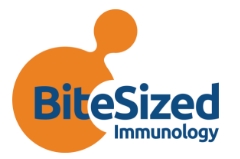BiteSized Immunology: Cells

NKT Cells: Invariant
Invariant natural killer T (iNKT) cells, also known as type I or classical NKT cells, are a distinct population of T cells that express an invariant aβ T-cell receptor (TCR) and a number of cell surface molecules in common with natural killer (NK) cells. Although iNKT cells are rare in the human blood pool, comprising just 0.01-1% of peripheral blood mononuclear cells (PBMCs), they are important immunoregulatory cells rapidly producing large amounts of cytokines that can influence other immune cells.
Recognition of antigen
iNKT cells express a restricted TCR repertoire that, in humans, is composed of a Va24-Ja18 TCRa chain preferentially coupled with a Vβ11 TCRβ chain. Unlike conventional T cells, which mostly recognise peptide antigens presented by MHC molecules, iNKT cells recognise glycolipid antigens presented by the non-polymorphic MHC class I-like molecule, CD1d. iNKT cells are frequently characterised by the recognition of the prototypical glycolipid, a–galactosylceramide (a-GalCer), a marine-sponge-derived agent, which also potently activates them and has strong anti-tumour activity.
Immunoregulatory roles
Functionally, human iNKT cells can be divided into three subpopulations, which are either CD4+, CD8+ or CD4- CD8- (DN). In vitro studies have shown that CD4+ iNKT cells tend to produce both Th1 and Th2-type cytokines and may have a more immunoregulatory role, while CD8+ and DN iNKT cells appear more Th1-like in response and have a stronger cytolytic ability. iNKT cell-derived cytokines and chemokines can modulate several other cell types, including NK cells, conventional CD4+ and CD8+ T cells, macrophages, neutrophils and B cells as well as recruiting and activating dendritic cells.

Role in disease
iNKT cells have been implicated to play a role in a number of immune-related diseases. Their multi-functional responses have been shown to enhance microbial and tumour immunity as well as suppressing autoimmune disease and promoting tolerance. However, iNKTs have also been shown to exacerbate certain other diseases such as allergy. There are many ongoing clinical studies that hope to exploit the potential immunotherapeutic properties of iNKT cells.
© The copyright for this work resides with the author
